International Trade, Finance, and Investment Analysis Report
VerifiedAdded on 2020/03/16
|21
|4539
|215
Report
AI Summary
This report provides a comprehensive analysis of capital allocation within the domestic economy of the United Kingdom and the emerging economy of China, focusing on international trade, finance, and investment. It begins with an overview of financial markets and their mechanisms, followed by an in-depth examination of capital allocation in the UK, including financial instruments, borrowing practices, and government policies. The report then explores international trade theories, such as comparative advantage and factor proportion theory, to explain capital allocation in international markets. It evaluates the Chinese economy, highlighting challenges related to industrialization and trade policies. The analysis incorporates aspects like stock exchanges, asset management, and the role of government in fiscal and monetary policies. The report concludes with a synthesis of the key findings and insights into the complexities of global financial markets and capital allocation strategies.
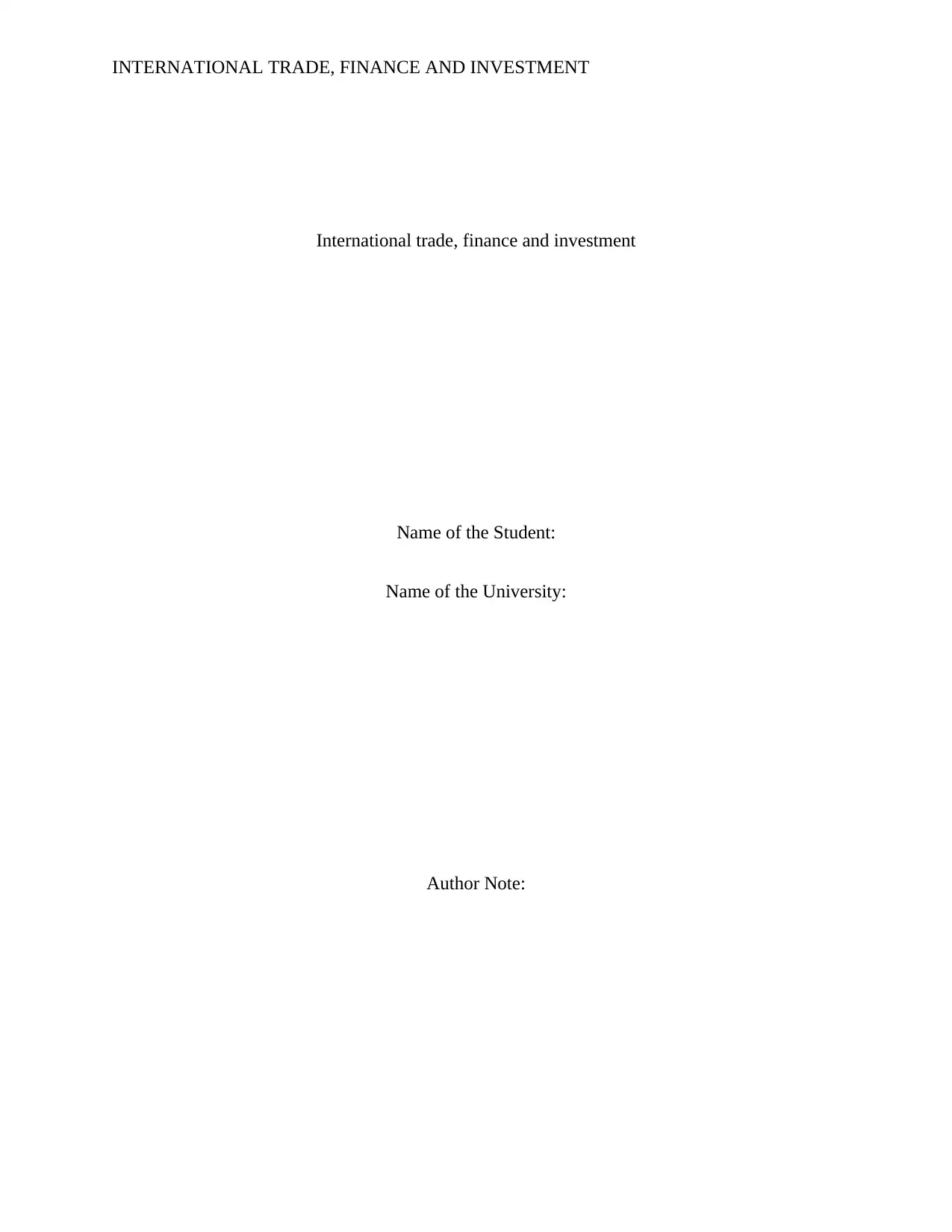
INTERNATIONAL TRADE, FINANCE AND INVESTMENT
International trade, finance and investment
Name of the Student:
Name of the University:
Author Note:
International trade, finance and investment
Name of the Student:
Name of the University:
Author Note:
Paraphrase This Document
Need a fresh take? Get an instant paraphrase of this document with our AI Paraphraser
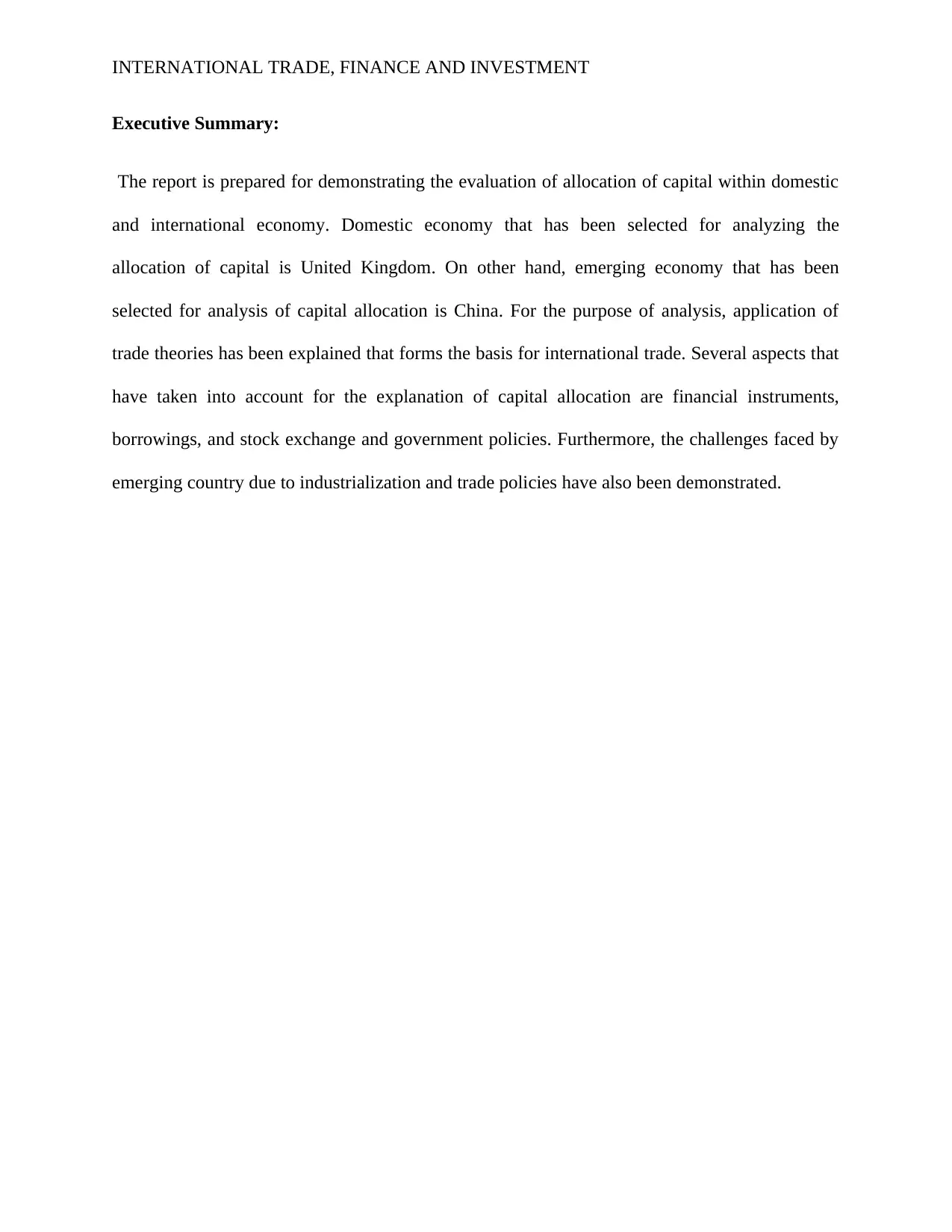
INTERNATIONAL TRADE, FINANCE AND INVESTMENT
Executive Summary:
The report is prepared for demonstrating the evaluation of allocation of capital within domestic
and international economy. Domestic economy that has been selected for analyzing the
allocation of capital is United Kingdom. On other hand, emerging economy that has been
selected for analysis of capital allocation is China. For the purpose of analysis, application of
trade theories has been explained that forms the basis for international trade. Several aspects that
have taken into account for the explanation of capital allocation are financial instruments,
borrowings, and stock exchange and government policies. Furthermore, the challenges faced by
emerging country due to industrialization and trade policies have also been demonstrated.
Executive Summary:
The report is prepared for demonstrating the evaluation of allocation of capital within domestic
and international economy. Domestic economy that has been selected for analyzing the
allocation of capital is United Kingdom. On other hand, emerging economy that has been
selected for analysis of capital allocation is China. For the purpose of analysis, application of
trade theories has been explained that forms the basis for international trade. Several aspects that
have taken into account for the explanation of capital allocation are financial instruments,
borrowings, and stock exchange and government policies. Furthermore, the challenges faced by
emerging country due to industrialization and trade policies have also been demonstrated.
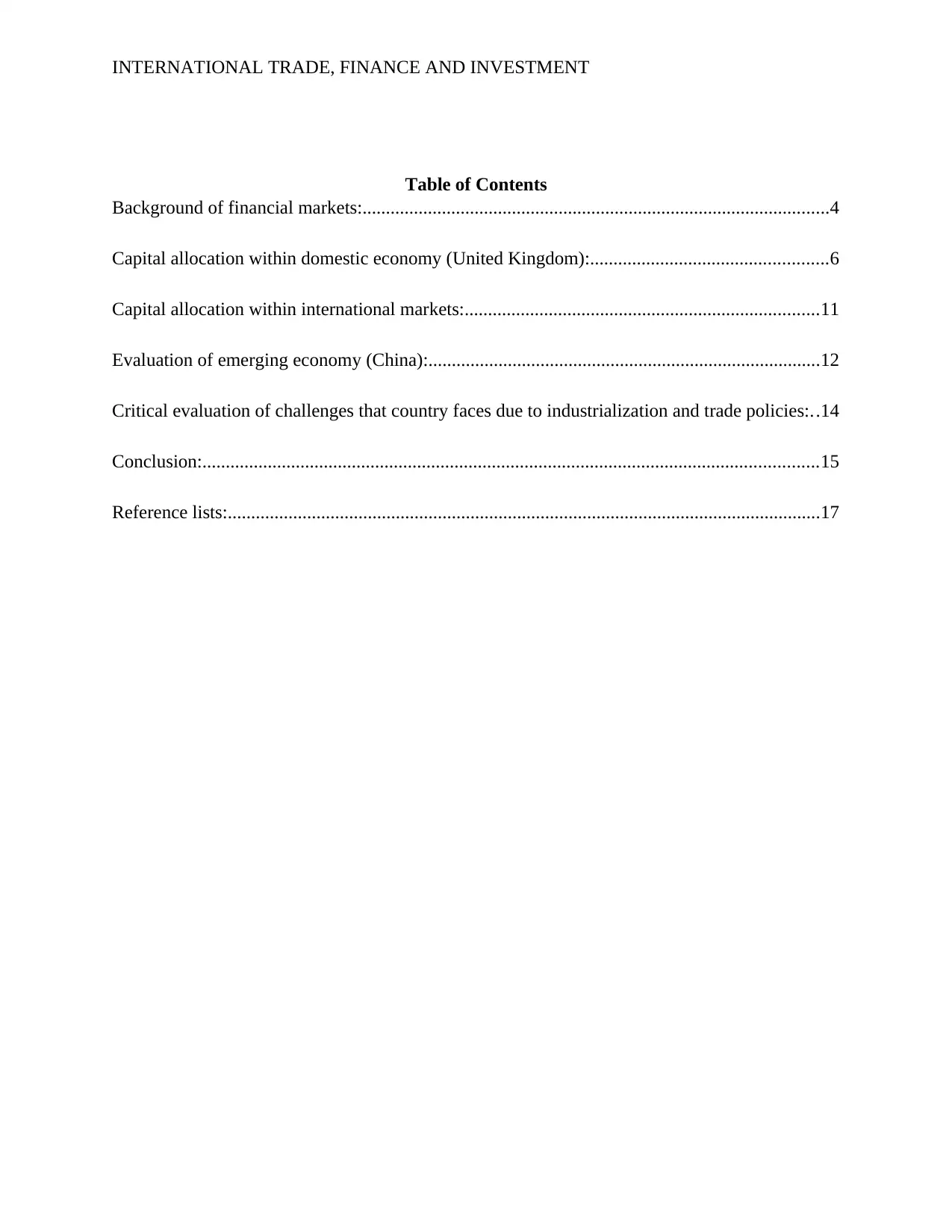
INTERNATIONAL TRADE, FINANCE AND INVESTMENT
Table of Contents
Background of financial markets:....................................................................................................4
Capital allocation within domestic economy (United Kingdom):...................................................6
Capital allocation within international markets:............................................................................11
Evaluation of emerging economy (China):....................................................................................12
Critical evaluation of challenges that country faces due to industrialization and trade policies:..14
Conclusion:....................................................................................................................................15
Reference lists:...............................................................................................................................17
Table of Contents
Background of financial markets:....................................................................................................4
Capital allocation within domestic economy (United Kingdom):...................................................6
Capital allocation within international markets:............................................................................11
Evaluation of emerging economy (China):....................................................................................12
Critical evaluation of challenges that country faces due to industrialization and trade policies:..14
Conclusion:....................................................................................................................................15
Reference lists:...............................................................................................................................17
⊘ This is a preview!⊘
Do you want full access?
Subscribe today to unlock all pages.

Trusted by 1+ million students worldwide
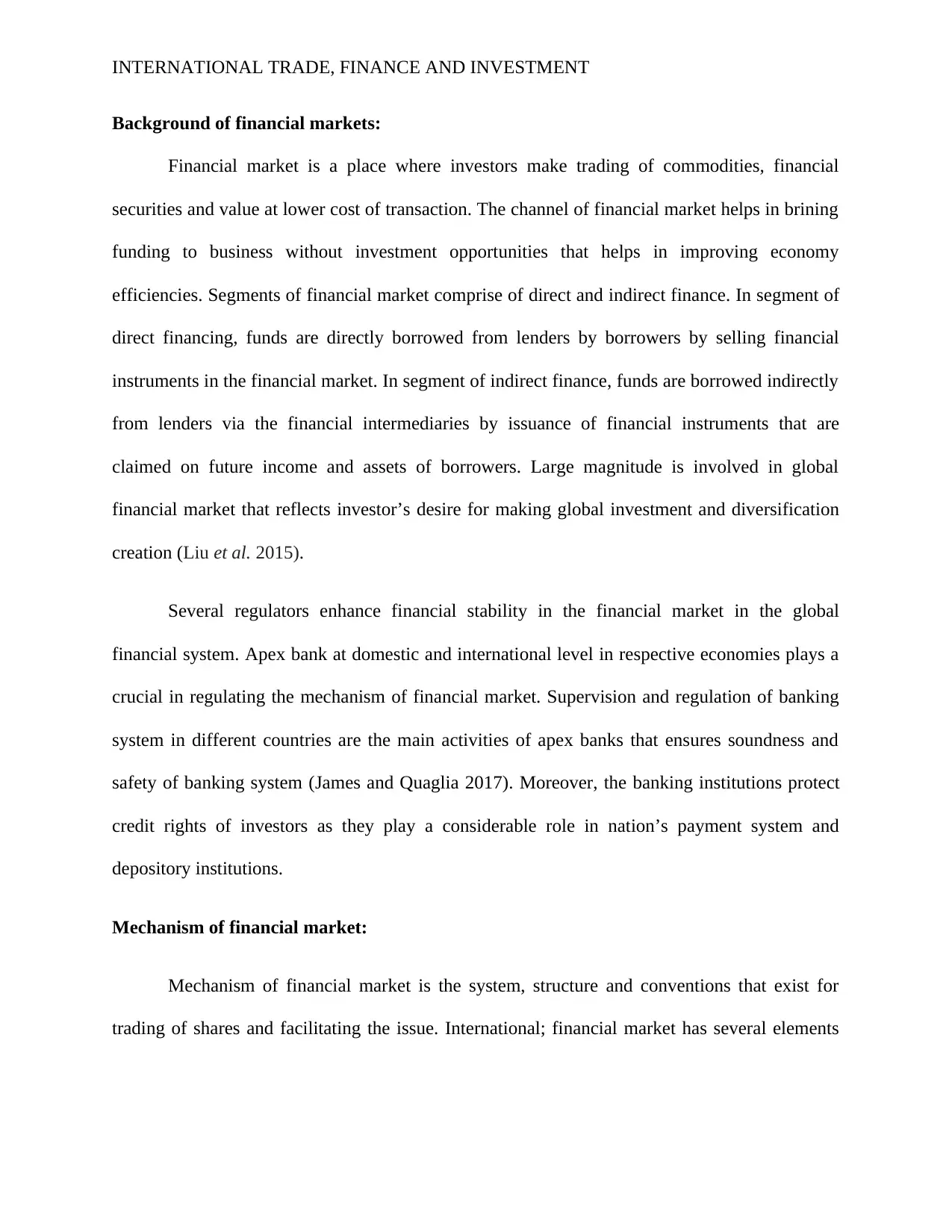
INTERNATIONAL TRADE, FINANCE AND INVESTMENT
Background of financial markets:
Financial market is a place where investors make trading of commodities, financial
securities and value at lower cost of transaction. The channel of financial market helps in brining
funding to business without investment opportunities that helps in improving economy
efficiencies. Segments of financial market comprise of direct and indirect finance. In segment of
direct financing, funds are directly borrowed from lenders by borrowers by selling financial
instruments in the financial market. In segment of indirect finance, funds are borrowed indirectly
from lenders via the financial intermediaries by issuance of financial instruments that are
claimed on future income and assets of borrowers. Large magnitude is involved in global
financial market that reflects investor’s desire for making global investment and diversification
creation (Liu et al. 2015).
Several regulators enhance financial stability in the financial market in the global
financial system. Apex bank at domestic and international level in respective economies plays a
crucial in regulating the mechanism of financial market. Supervision and regulation of banking
system in different countries are the main activities of apex banks that ensures soundness and
safety of banking system (James and Quaglia 2017). Moreover, the banking institutions protect
credit rights of investors as they play a considerable role in nation’s payment system and
depository institutions.
Mechanism of financial market:
Mechanism of financial market is the system, structure and conventions that exist for
trading of shares and facilitating the issue. International; financial market has several elements
Background of financial markets:
Financial market is a place where investors make trading of commodities, financial
securities and value at lower cost of transaction. The channel of financial market helps in brining
funding to business without investment opportunities that helps in improving economy
efficiencies. Segments of financial market comprise of direct and indirect finance. In segment of
direct financing, funds are directly borrowed from lenders by borrowers by selling financial
instruments in the financial market. In segment of indirect finance, funds are borrowed indirectly
from lenders via the financial intermediaries by issuance of financial instruments that are
claimed on future income and assets of borrowers. Large magnitude is involved in global
financial market that reflects investor’s desire for making global investment and diversification
creation (Liu et al. 2015).
Several regulators enhance financial stability in the financial market in the global
financial system. Apex bank at domestic and international level in respective economies plays a
crucial in regulating the mechanism of financial market. Supervision and regulation of banking
system in different countries are the main activities of apex banks that ensures soundness and
safety of banking system (James and Quaglia 2017). Moreover, the banking institutions protect
credit rights of investors as they play a considerable role in nation’s payment system and
depository institutions.
Mechanism of financial market:
Mechanism of financial market is the system, structure and conventions that exist for
trading of shares and facilitating the issue. International; financial market has several elements
Paraphrase This Document
Need a fresh take? Get an instant paraphrase of this document with our AI Paraphraser
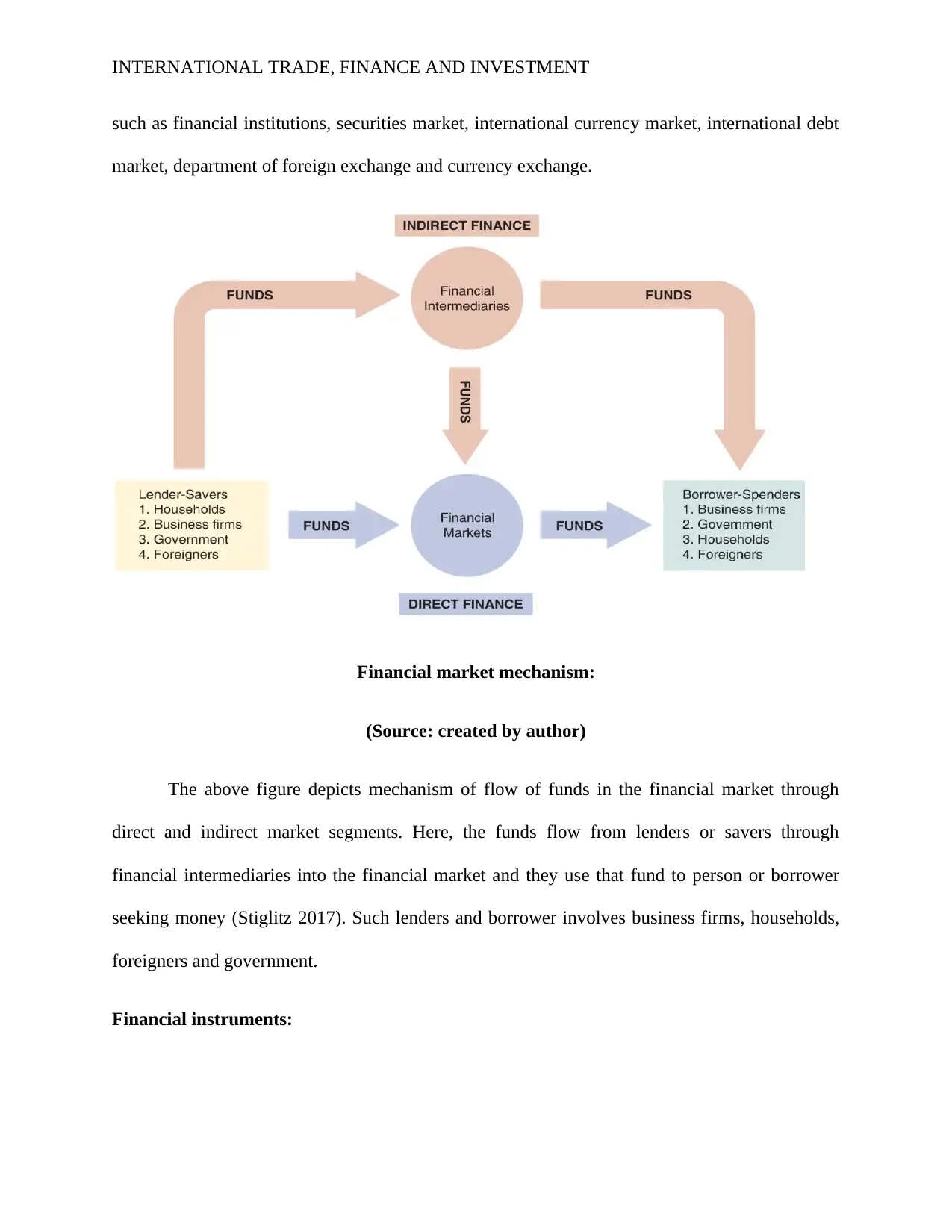
INTERNATIONAL TRADE, FINANCE AND INVESTMENT
such as financial institutions, securities market, international currency market, international debt
market, department of foreign exchange and currency exchange.
Financial market mechanism:
(Source: created by author)
The above figure depicts mechanism of flow of funds in the financial market through
direct and indirect market segments. Here, the funds flow from lenders or savers through
financial intermediaries into the financial market and they use that fund to person or borrower
seeking money (Stiglitz 2017). Such lenders and borrower involves business firms, households,
foreigners and government.
Financial instruments:
such as financial institutions, securities market, international currency market, international debt
market, department of foreign exchange and currency exchange.
Financial market mechanism:
(Source: created by author)
The above figure depicts mechanism of flow of funds in the financial market through
direct and indirect market segments. Here, the funds flow from lenders or savers through
financial intermediaries into the financial market and they use that fund to person or borrower
seeking money (Stiglitz 2017). Such lenders and borrower involves business firms, households,
foreigners and government.
Financial instruments:
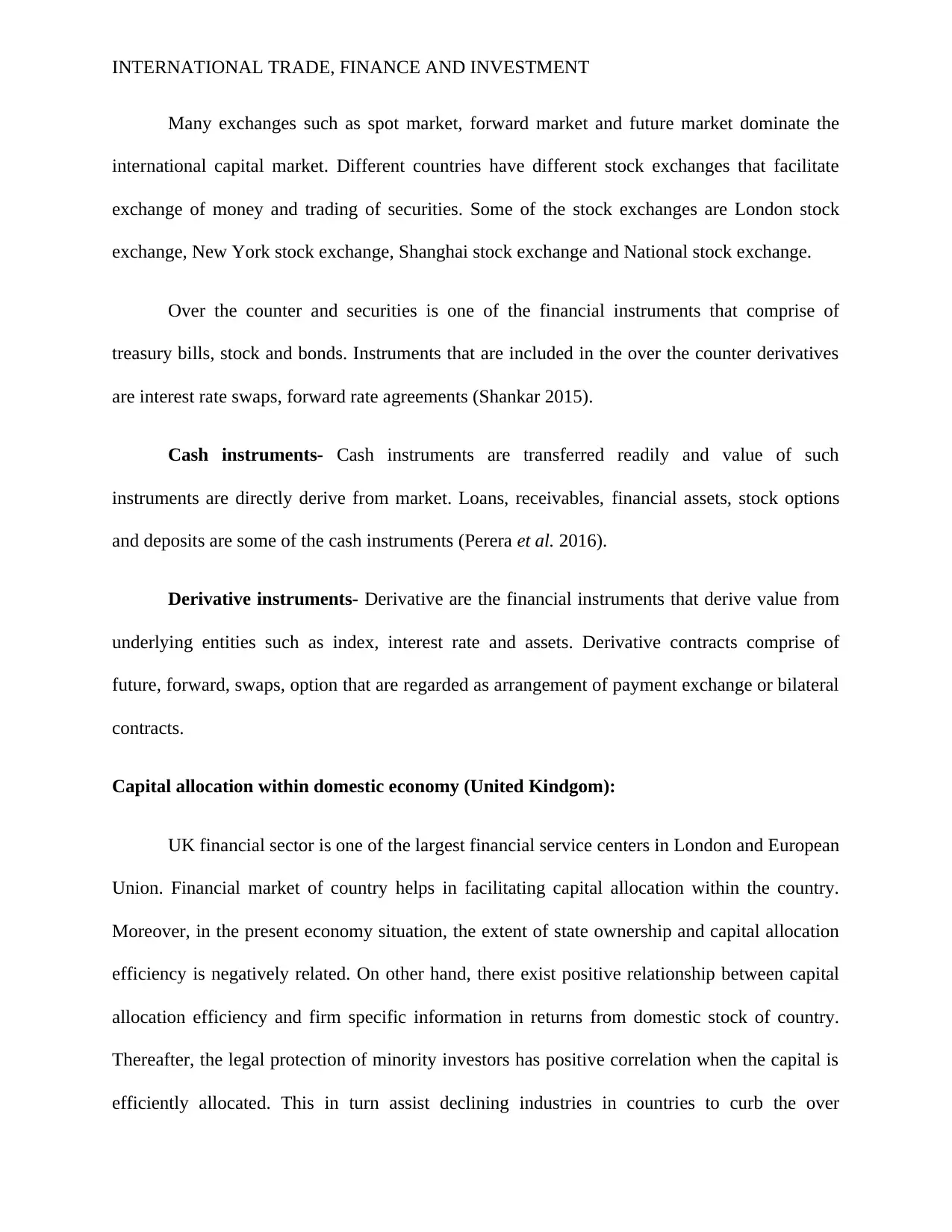
INTERNATIONAL TRADE, FINANCE AND INVESTMENT
Many exchanges such as spot market, forward market and future market dominate the
international capital market. Different countries have different stock exchanges that facilitate
exchange of money and trading of securities. Some of the stock exchanges are London stock
exchange, New York stock exchange, Shanghai stock exchange and National stock exchange.
Over the counter and securities is one of the financial instruments that comprise of
treasury bills, stock and bonds. Instruments that are included in the over the counter derivatives
are interest rate swaps, forward rate agreements (Shankar 2015).
Cash instruments- Cash instruments are transferred readily and value of such
instruments are directly derive from market. Loans, receivables, financial assets, stock options
and deposits are some of the cash instruments (Perera et al. 2016).
Derivative instruments- Derivative are the financial instruments that derive value from
underlying entities such as index, interest rate and assets. Derivative contracts comprise of
future, forward, swaps, option that are regarded as arrangement of payment exchange or bilateral
contracts.
Capital allocation within domestic economy (United Kindgom):
UK financial sector is one of the largest financial service centers in London and European
Union. Financial market of country helps in facilitating capital allocation within the country.
Moreover, in the present economy situation, the extent of state ownership and capital allocation
efficiency is negatively related. On other hand, there exist positive relationship between capital
allocation efficiency and firm specific information in returns from domestic stock of country.
Thereafter, the legal protection of minority investors has positive correlation when the capital is
efficiently allocated. This in turn assist declining industries in countries to curb the over
Many exchanges such as spot market, forward market and future market dominate the
international capital market. Different countries have different stock exchanges that facilitate
exchange of money and trading of securities. Some of the stock exchanges are London stock
exchange, New York stock exchange, Shanghai stock exchange and National stock exchange.
Over the counter and securities is one of the financial instruments that comprise of
treasury bills, stock and bonds. Instruments that are included in the over the counter derivatives
are interest rate swaps, forward rate agreements (Shankar 2015).
Cash instruments- Cash instruments are transferred readily and value of such
instruments are directly derive from market. Loans, receivables, financial assets, stock options
and deposits are some of the cash instruments (Perera et al. 2016).
Derivative instruments- Derivative are the financial instruments that derive value from
underlying entities such as index, interest rate and assets. Derivative contracts comprise of
future, forward, swaps, option that are regarded as arrangement of payment exchange or bilateral
contracts.
Capital allocation within domestic economy (United Kindgom):
UK financial sector is one of the largest financial service centers in London and European
Union. Financial market of country helps in facilitating capital allocation within the country.
Moreover, in the present economy situation, the extent of state ownership and capital allocation
efficiency is negatively related. On other hand, there exist positive relationship between capital
allocation efficiency and firm specific information in returns from domestic stock of country.
Thereafter, the legal protection of minority investors has positive correlation when the capital is
efficiently allocated. This in turn assist declining industries in countries to curb the over
⊘ This is a preview!⊘
Do you want full access?
Subscribe today to unlock all pages.

Trusted by 1+ million students worldwide
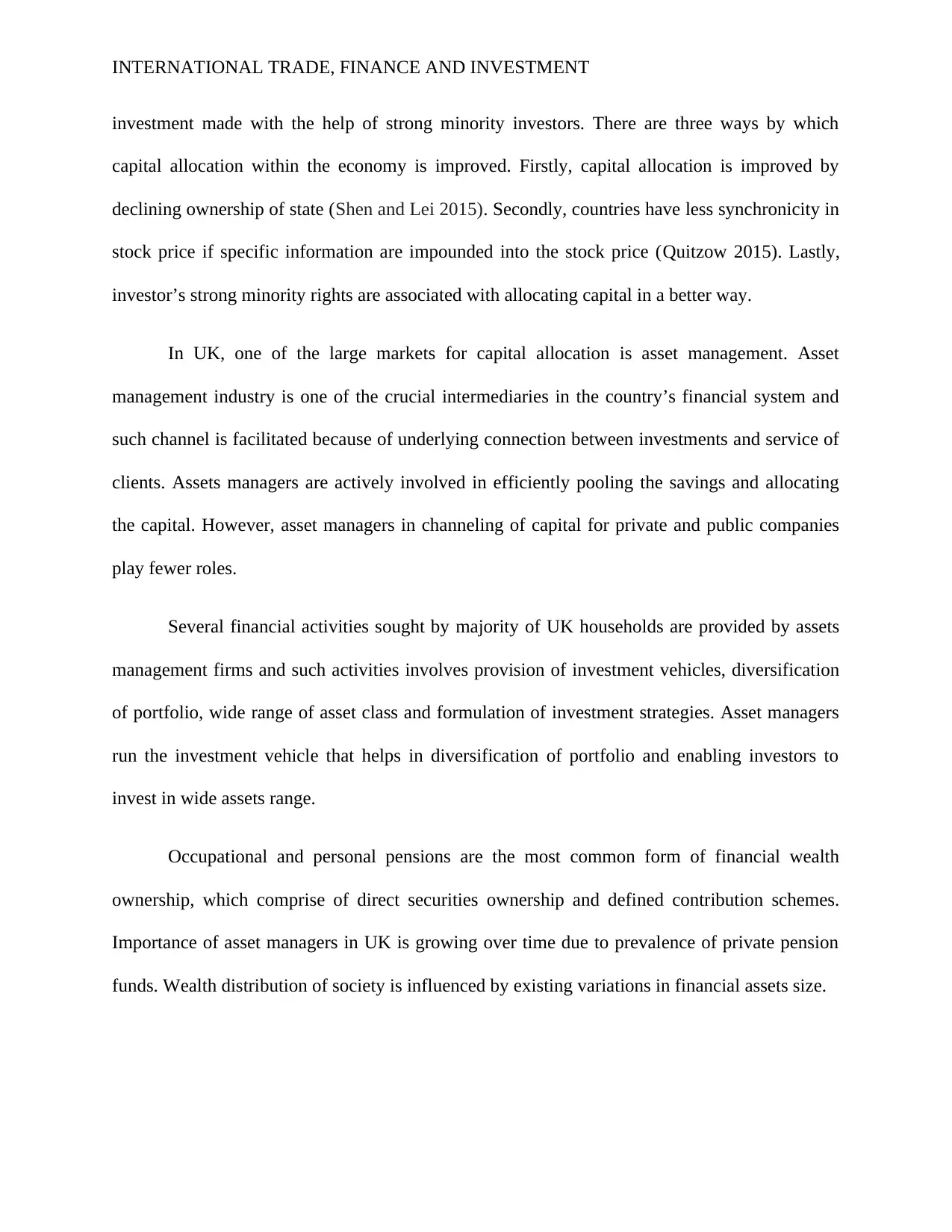
INTERNATIONAL TRADE, FINANCE AND INVESTMENT
investment made with the help of strong minority investors. There are three ways by which
capital allocation within the economy is improved. Firstly, capital allocation is improved by
declining ownership of state (Shen and Lei 2015). Secondly, countries have less synchronicity in
stock price if specific information are impounded into the stock price (Quitzow 2015). Lastly,
investor’s strong minority rights are associated with allocating capital in a better way.
In UK, one of the large markets for capital allocation is asset management. Asset
management industry is one of the crucial intermediaries in the country’s financial system and
such channel is facilitated because of underlying connection between investments and service of
clients. Assets managers are actively involved in efficiently pooling the savings and allocating
the capital. However, asset managers in channeling of capital for private and public companies
play fewer roles.
Several financial activities sought by majority of UK households are provided by assets
management firms and such activities involves provision of investment vehicles, diversification
of portfolio, wide range of asset class and formulation of investment strategies. Asset managers
run the investment vehicle that helps in diversification of portfolio and enabling investors to
invest in wide assets range.
Occupational and personal pensions are the most common form of financial wealth
ownership, which comprise of direct securities ownership and defined contribution schemes.
Importance of asset managers in UK is growing over time due to prevalence of private pension
funds. Wealth distribution of society is influenced by existing variations in financial assets size.
investment made with the help of strong minority investors. There are three ways by which
capital allocation within the economy is improved. Firstly, capital allocation is improved by
declining ownership of state (Shen and Lei 2015). Secondly, countries have less synchronicity in
stock price if specific information are impounded into the stock price (Quitzow 2015). Lastly,
investor’s strong minority rights are associated with allocating capital in a better way.
In UK, one of the large markets for capital allocation is asset management. Asset
management industry is one of the crucial intermediaries in the country’s financial system and
such channel is facilitated because of underlying connection between investments and service of
clients. Assets managers are actively involved in efficiently pooling the savings and allocating
the capital. However, asset managers in channeling of capital for private and public companies
play fewer roles.
Several financial activities sought by majority of UK households are provided by assets
management firms and such activities involves provision of investment vehicles, diversification
of portfolio, wide range of asset class and formulation of investment strategies. Asset managers
run the investment vehicle that helps in diversification of portfolio and enabling investors to
invest in wide assets range.
Occupational and personal pensions are the most common form of financial wealth
ownership, which comprise of direct securities ownership and defined contribution schemes.
Importance of asset managers in UK is growing over time due to prevalence of private pension
funds. Wealth distribution of society is influenced by existing variations in financial assets size.
Paraphrase This Document
Need a fresh take? Get an instant paraphrase of this document with our AI Paraphraser
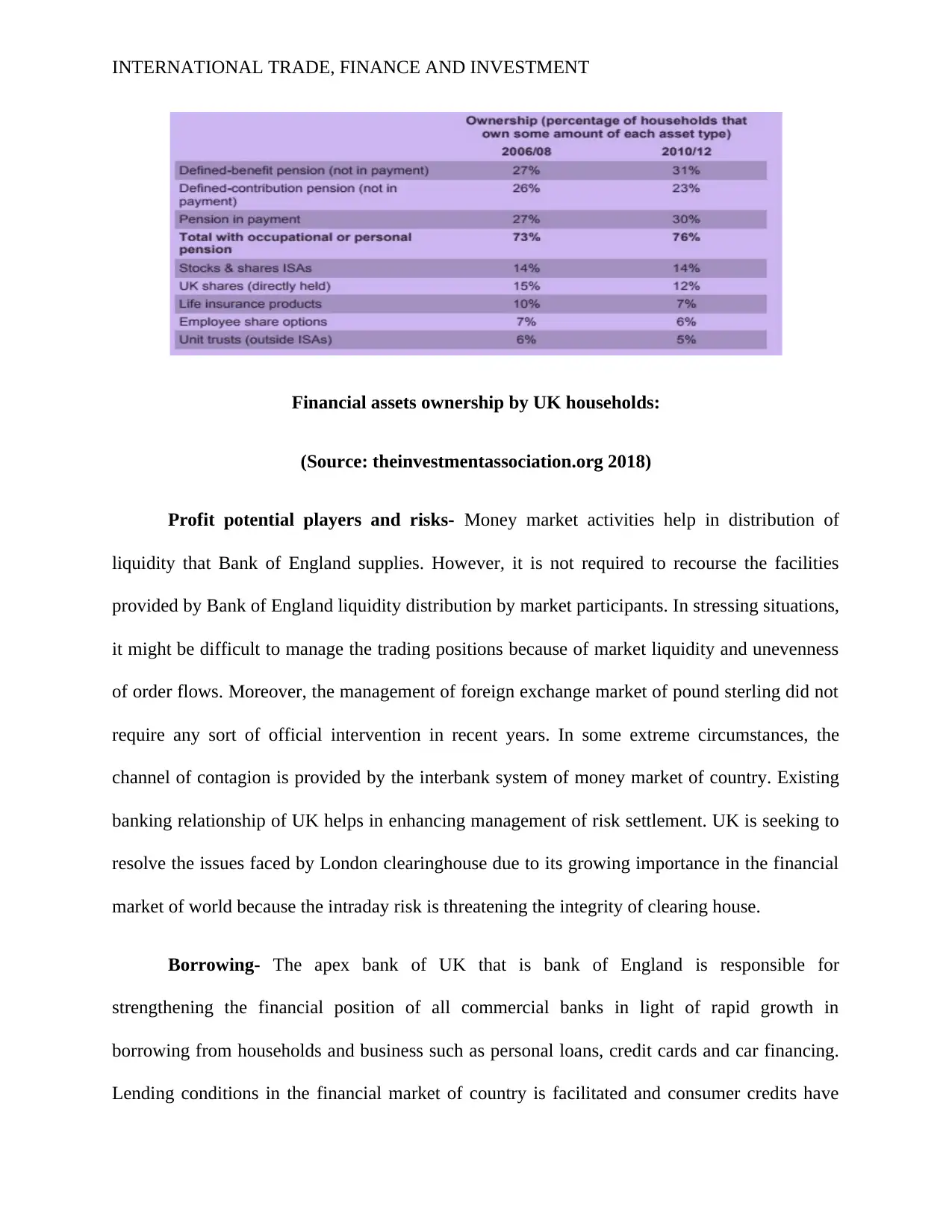
INTERNATIONAL TRADE, FINANCE AND INVESTMENT
Financial assets ownership by UK households:
(Source: theinvestmentassociation.org 2018)
Profit potential players and risks- Money market activities help in distribution of
liquidity that Bank of England supplies. However, it is not required to recourse the facilities
provided by Bank of England liquidity distribution by market participants. In stressing situations,
it might be difficult to manage the trading positions because of market liquidity and unevenness
of order flows. Moreover, the management of foreign exchange market of pound sterling did not
require any sort of official intervention in recent years. In some extreme circumstances, the
channel of contagion is provided by the interbank system of money market of country. Existing
banking relationship of UK helps in enhancing management of risk settlement. UK is seeking to
resolve the issues faced by London clearinghouse due to its growing importance in the financial
market of world because the intraday risk is threatening the integrity of clearing house.
Borrowing- The apex bank of UK that is bank of England is responsible for
strengthening the financial position of all commercial banks in light of rapid growth in
borrowing from households and business such as personal loans, credit cards and car financing.
Lending conditions in the financial market of country is facilitated and consumer credits have
Financial assets ownership by UK households:
(Source: theinvestmentassociation.org 2018)
Profit potential players and risks- Money market activities help in distribution of
liquidity that Bank of England supplies. However, it is not required to recourse the facilities
provided by Bank of England liquidity distribution by market participants. In stressing situations,
it might be difficult to manage the trading positions because of market liquidity and unevenness
of order flows. Moreover, the management of foreign exchange market of pound sterling did not
require any sort of official intervention in recent years. In some extreme circumstances, the
channel of contagion is provided by the interbank system of money market of country. Existing
banking relationship of UK helps in enhancing management of risk settlement. UK is seeking to
resolve the issues faced by London clearinghouse due to its growing importance in the financial
market of world because the intraday risk is threatening the integrity of clearing house.
Borrowing- The apex bank of UK that is bank of England is responsible for
strengthening the financial position of all commercial banks in light of rapid growth in
borrowing from households and business such as personal loans, credit cards and car financing.
Lending conditions in the financial market of country is facilitated and consumer credits have
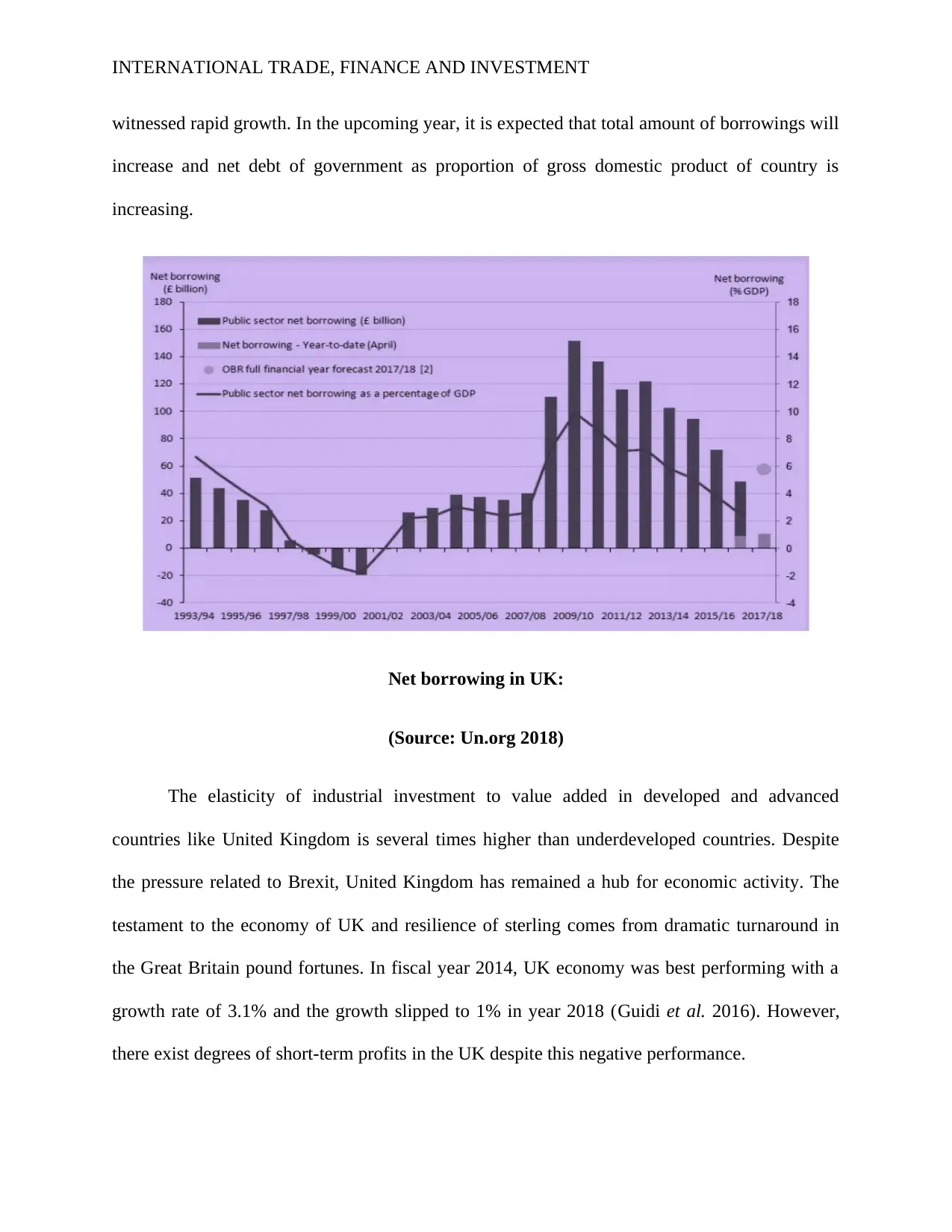
INTERNATIONAL TRADE, FINANCE AND INVESTMENT
witnessed rapid growth. In the upcoming year, it is expected that total amount of borrowings will
increase and net debt of government as proportion of gross domestic product of country is
increasing.
Net borrowing in UK:
(Source: Un.org 2018)
The elasticity of industrial investment to value added in developed and advanced
countries like United Kingdom is several times higher than underdeveloped countries. Despite
the pressure related to Brexit, United Kingdom has remained a hub for economic activity. The
testament to the economy of UK and resilience of sterling comes from dramatic turnaround in
the Great Britain pound fortunes. In fiscal year 2014, UK economy was best performing with a
growth rate of 3.1% and the growth slipped to 1% in year 2018 (Guidi et al. 2016). However,
there exist degrees of short-term profits in the UK despite this negative performance.
witnessed rapid growth. In the upcoming year, it is expected that total amount of borrowings will
increase and net debt of government as proportion of gross domestic product of country is
increasing.
Net borrowing in UK:
(Source: Un.org 2018)
The elasticity of industrial investment to value added in developed and advanced
countries like United Kingdom is several times higher than underdeveloped countries. Despite
the pressure related to Brexit, United Kingdom has remained a hub for economic activity. The
testament to the economy of UK and resilience of sterling comes from dramatic turnaround in
the Great Britain pound fortunes. In fiscal year 2014, UK economy was best performing with a
growth rate of 3.1% and the growth slipped to 1% in year 2018 (Guidi et al. 2016). However,
there exist degrees of short-term profits in the UK despite this negative performance.
⊘ This is a preview!⊘
Do you want full access?
Subscribe today to unlock all pages.

Trusted by 1+ million students worldwide
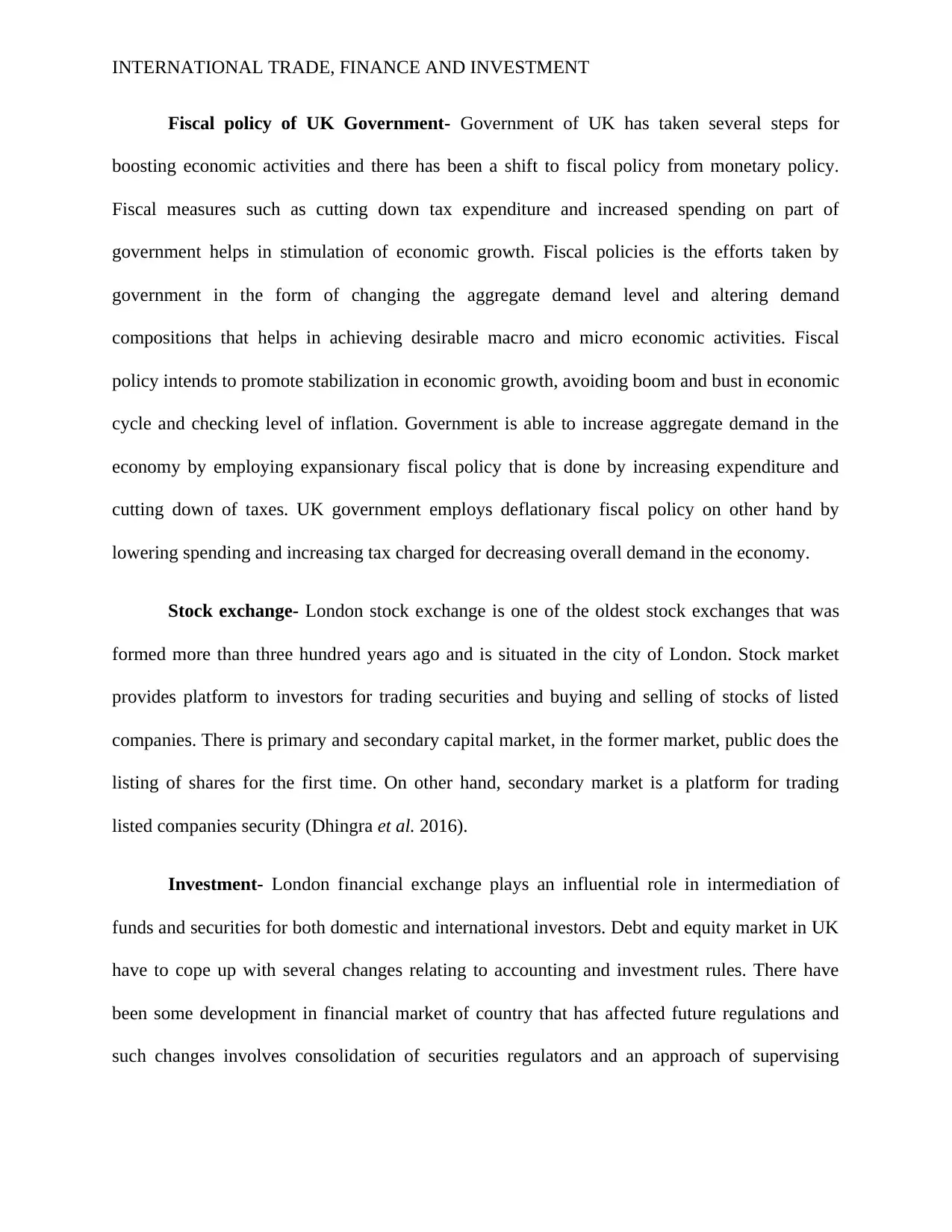
INTERNATIONAL TRADE, FINANCE AND INVESTMENT
Fiscal policy of UK Government- Government of UK has taken several steps for
boosting economic activities and there has been a shift to fiscal policy from monetary policy.
Fiscal measures such as cutting down tax expenditure and increased spending on part of
government helps in stimulation of economic growth. Fiscal policies is the efforts taken by
government in the form of changing the aggregate demand level and altering demand
compositions that helps in achieving desirable macro and micro economic activities. Fiscal
policy intends to promote stabilization in economic growth, avoiding boom and bust in economic
cycle and checking level of inflation. Government is able to increase aggregate demand in the
economy by employing expansionary fiscal policy that is done by increasing expenditure and
cutting down of taxes. UK government employs deflationary fiscal policy on other hand by
lowering spending and increasing tax charged for decreasing overall demand in the economy.
Stock exchange- London stock exchange is one of the oldest stock exchanges that was
formed more than three hundred years ago and is situated in the city of London. Stock market
provides platform to investors for trading securities and buying and selling of stocks of listed
companies. There is primary and secondary capital market, in the former market, public does the
listing of shares for the first time. On other hand, secondary market is a platform for trading
listed companies security (Dhingra et al. 2016).
Investment- London financial exchange plays an influential role in intermediation of
funds and securities for both domestic and international investors. Debt and equity market in UK
have to cope up with several changes relating to accounting and investment rules. There have
been some development in financial market of country that has affected future regulations and
such changes involves consolidation of securities regulators and an approach of supervising
Fiscal policy of UK Government- Government of UK has taken several steps for
boosting economic activities and there has been a shift to fiscal policy from monetary policy.
Fiscal measures such as cutting down tax expenditure and increased spending on part of
government helps in stimulation of economic growth. Fiscal policies is the efforts taken by
government in the form of changing the aggregate demand level and altering demand
compositions that helps in achieving desirable macro and micro economic activities. Fiscal
policy intends to promote stabilization in economic growth, avoiding boom and bust in economic
cycle and checking level of inflation. Government is able to increase aggregate demand in the
economy by employing expansionary fiscal policy that is done by increasing expenditure and
cutting down of taxes. UK government employs deflationary fiscal policy on other hand by
lowering spending and increasing tax charged for decreasing overall demand in the economy.
Stock exchange- London stock exchange is one of the oldest stock exchanges that was
formed more than three hundred years ago and is situated in the city of London. Stock market
provides platform to investors for trading securities and buying and selling of stocks of listed
companies. There is primary and secondary capital market, in the former market, public does the
listing of shares for the first time. On other hand, secondary market is a platform for trading
listed companies security (Dhingra et al. 2016).
Investment- London financial exchange plays an influential role in intermediation of
funds and securities for both domestic and international investors. Debt and equity market in UK
have to cope up with several changes relating to accounting and investment rules. There have
been some development in financial market of country that has affected future regulations and
such changes involves consolidation of securities regulators and an approach of supervising
Paraphrase This Document
Need a fresh take? Get an instant paraphrase of this document with our AI Paraphraser
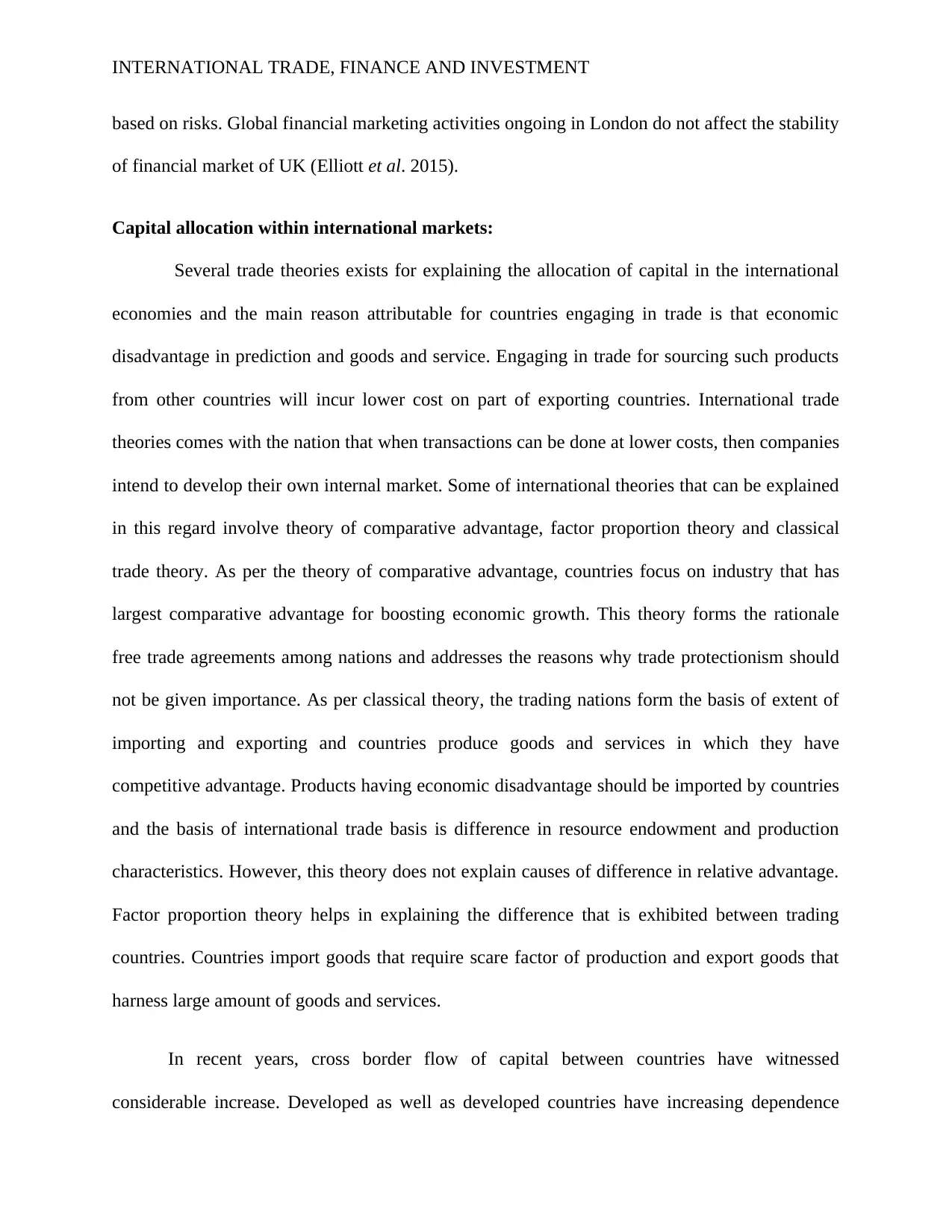
INTERNATIONAL TRADE, FINANCE AND INVESTMENT
based on risks. Global financial marketing activities ongoing in London do not affect the stability
of financial market of UK (Elliott et al. 2015).
Capital allocation within international markets:
Several trade theories exists for explaining the allocation of capital in the international
economies and the main reason attributable for countries engaging in trade is that economic
disadvantage in prediction and goods and service. Engaging in trade for sourcing such products
from other countries will incur lower cost on part of exporting countries. International trade
theories comes with the nation that when transactions can be done at lower costs, then companies
intend to develop their own internal market. Some of international theories that can be explained
in this regard involve theory of comparative advantage, factor proportion theory and classical
trade theory. As per the theory of comparative advantage, countries focus on industry that has
largest comparative advantage for boosting economic growth. This theory forms the rationale
free trade agreements among nations and addresses the reasons why trade protectionism should
not be given importance. As per classical theory, the trading nations form the basis of extent of
importing and exporting and countries produce goods and services in which they have
competitive advantage. Products having economic disadvantage should be imported by countries
and the basis of international trade basis is difference in resource endowment and production
characteristics. However, this theory does not explain causes of difference in relative advantage.
Factor proportion theory helps in explaining the difference that is exhibited between trading
countries. Countries import goods that require scare factor of production and export goods that
harness large amount of goods and services.
In recent years, cross border flow of capital between countries have witnessed
considerable increase. Developed as well as developed countries have increasing dependence
based on risks. Global financial marketing activities ongoing in London do not affect the stability
of financial market of UK (Elliott et al. 2015).
Capital allocation within international markets:
Several trade theories exists for explaining the allocation of capital in the international
economies and the main reason attributable for countries engaging in trade is that economic
disadvantage in prediction and goods and service. Engaging in trade for sourcing such products
from other countries will incur lower cost on part of exporting countries. International trade
theories comes with the nation that when transactions can be done at lower costs, then companies
intend to develop their own internal market. Some of international theories that can be explained
in this regard involve theory of comparative advantage, factor proportion theory and classical
trade theory. As per the theory of comparative advantage, countries focus on industry that has
largest comparative advantage for boosting economic growth. This theory forms the rationale
free trade agreements among nations and addresses the reasons why trade protectionism should
not be given importance. As per classical theory, the trading nations form the basis of extent of
importing and exporting and countries produce goods and services in which they have
competitive advantage. Products having economic disadvantage should be imported by countries
and the basis of international trade basis is difference in resource endowment and production
characteristics. However, this theory does not explain causes of difference in relative advantage.
Factor proportion theory helps in explaining the difference that is exhibited between trading
countries. Countries import goods that require scare factor of production and export goods that
harness large amount of goods and services.
In recent years, cross border flow of capital between countries have witnessed
considerable increase. Developed as well as developed countries have increasing dependence
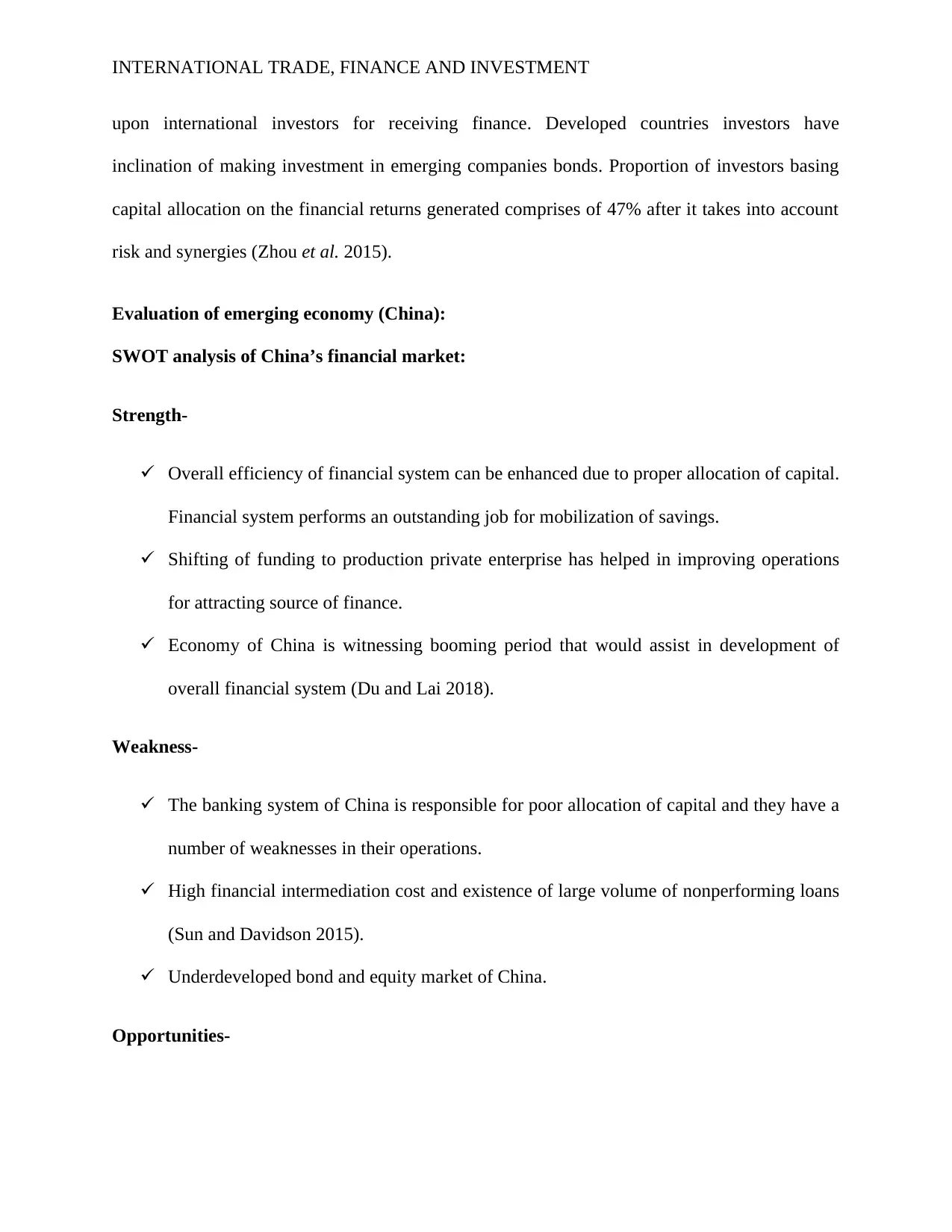
INTERNATIONAL TRADE, FINANCE AND INVESTMENT
upon international investors for receiving finance. Developed countries investors have
inclination of making investment in emerging companies bonds. Proportion of investors basing
capital allocation on the financial returns generated comprises of 47% after it takes into account
risk and synergies (Zhou et al. 2015).
Evaluation of emerging economy (China):
SWOT analysis of China’s financial market:
Strength-
Overall efficiency of financial system can be enhanced due to proper allocation of capital.
Financial system performs an outstanding job for mobilization of savings.
Shifting of funding to production private enterprise has helped in improving operations
for attracting source of finance.
Economy of China is witnessing booming period that would assist in development of
overall financial system (Du and Lai 2018).
Weakness-
The banking system of China is responsible for poor allocation of capital and they have a
number of weaknesses in their operations.
High financial intermediation cost and existence of large volume of nonperforming loans
(Sun and Davidson 2015).
Underdeveloped bond and equity market of China.
Opportunities-
upon international investors for receiving finance. Developed countries investors have
inclination of making investment in emerging companies bonds. Proportion of investors basing
capital allocation on the financial returns generated comprises of 47% after it takes into account
risk and synergies (Zhou et al. 2015).
Evaluation of emerging economy (China):
SWOT analysis of China’s financial market:
Strength-
Overall efficiency of financial system can be enhanced due to proper allocation of capital.
Financial system performs an outstanding job for mobilization of savings.
Shifting of funding to production private enterprise has helped in improving operations
for attracting source of finance.
Economy of China is witnessing booming period that would assist in development of
overall financial system (Du and Lai 2018).
Weakness-
The banking system of China is responsible for poor allocation of capital and they have a
number of weaknesses in their operations.
High financial intermediation cost and existence of large volume of nonperforming loans
(Sun and Davidson 2015).
Underdeveloped bond and equity market of China.
Opportunities-
⊘ This is a preview!⊘
Do you want full access?
Subscribe today to unlock all pages.

Trusted by 1+ million students worldwide
1 out of 21
Related Documents
Your All-in-One AI-Powered Toolkit for Academic Success.
+13062052269
info@desklib.com
Available 24*7 on WhatsApp / Email
![[object Object]](/_next/static/media/star-bottom.7253800d.svg)
Unlock your academic potential
Copyright © 2020–2026 A2Z Services. All Rights Reserved. Developed and managed by ZUCOL.




